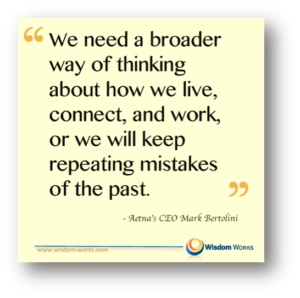 A few weeks ago I took part in the Wisdom 2.0 Summit. I sincerely appreciated this global conversation to tackle one of the great challenges of our age, as the organizers put it: to not only live connected to one another through technology, but to do so in ways that are beneficial to our own wellbeing, effective in our work, and useful to the world. At the heart of that challenge lies our ability to be mindful.
A few weeks ago I took part in the Wisdom 2.0 Summit. I sincerely appreciated this global conversation to tackle one of the great challenges of our age, as the organizers put it: to not only live connected to one another through technology, but to do so in ways that are beneficial to our own wellbeing, effective in our work, and useful to the world. At the heart of that challenge lies our ability to be mindful.
What exactly is mindfulness? You could say it is simply about living in the moment, although as ironies go, “living in the moment” is not always that simple. Our tech-heavy lifestyles often distract us. The promise of mindfulness then is to experience the present moment—the event, situation, or relationship you’re in—more fully, accepting it how it is without judgment. Yes, that “without judgment” part can be tricky.
So in comes mindfulness training, making an impact in every corner of life and work. In health and wellness, it helps people cope with chronic disease, recover from illness, and enhance personal vitality. In sports, it fortifies athlete performance. At work, it strengthens employees’ abilities to manage stress, self-direct their professional development, and boost effectiveness for themselves and their workgroups.
We used mindfulness training as one thread in a larger effort to reboot the executive R&D team of a global consumer goods company. The R&D function had become silo’ed across various regions—Asia, North America, South America, and Europe—and as a result, it lacked the cross-pollination of new ideas and best practices required to bring real innovation and value to the organization. Leading a more strategic function, however, meant members of the executive team would need to new build capabilities to:
- Bring a shared wisdom to key decisions. (Already, this is a big stretch for many teams!)
- Function as true organizational change agents, as well as cope with the stressors that naturally arise with that role.
- Work effectively with widely differing belief systems.
- Observe, appraise, and make real-time shifts to their effectiveness as a team.
Any team attempting to embody a whole new way of operating knows these changes are no small feat.
As these executives developed their mindfulness muscles, what did they find? They were better able to:
- Manage stress proactively rather than react to it with negative behaviors such as over-responsibility, blame, and guilt
- Build networks of support when they needed it, for instance, turning to others at work and home for emotional encouragement and seeking out assistance when stress felt high
- Rise above immediate crises with a new and positive perspective which they could use for inspiring productive responses from others
- Bring a sense of humor to critical moments where stress-relief in their lives, teamwork, and organization was much-needed
- Use higher-order values such as a meaning and purpose to cope with demanding situations
Mindfulness became a foundational capacity upon which these leaders relied for building effectiveness, and wellbeing, as individuals and as a group.
Well-respected institutions such as INSEAD are demonstrating mindfulness also influences leadership teams to better our world. Mindfulness skills are linked with leaders prioritizing transcendent values such as responsibility, wisdom, forgiving, inner harmony, and unity with nature, values considered to support socially-responsible decisions and behaviors intended to serve us all.
At the Wisdom 2.0 Summit, Aetna’s CEO Mark Bertolini claimed, “We need a broader way of thinking about how we live, connect, and work, or we will keep repeating mistakes of the past.” I’ve come to believe that when we nurture our talent for mindfulness, we’re more apt to listen to the issues and aspirations of the world and our lives more intently, incorporate a broader circle of concern (from “me” to “all of us”) into our sphere of responsibility, and take actions at work and at home with a longer time horizon in mind. That is, the act of mindfulness helps us make decisions that are more beneficial to our wellbeing, effective at work, and useful to the world.
Want to talk more about mindfulness, leadership, and making an impact that matters in life, work, and the world? Contact me at renee@wisdom-works.com. I would be delighted!
READ MORE





